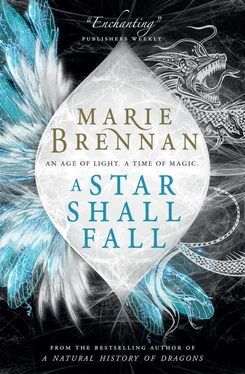At last the procession reached its end: the obelisk listing Princes of the Stone. A small flame burnt in its base, and a new line had been chiselled into the plaque:
MR. GALEN ST. CLAIR 1756–1759
A small group waited there. Mrs. Vesey supported Delphia St. Clair, who wore mourning sewn for her by the finest faerie seamstresses. Lune stood alone, dressed in the same white she wore every October, when she came to grieve for Michael Deven.
And Irrith, clad in green, the executioner attending the funeral.
The honour guard lifted the carriage’s burden down to the grass. Irrith stared at the pall draped over the coffin, grateful for its presence. She preferred to remember the man she’d first seen, extending his hand to the muddy, swearing sprite who had just fallen through the Newgate entrance; but every time she blinked, she saw the gaping voids of Galen’s eyes, burnt out by the Dragon. And nothing could block her ears to the memory of that searing voice, taunting her with the inexorable truth. Kill him, send him to Hell, and I will go with him, for I am Galen St. Clair.
They had saved the Onyx Hall, but nothing could rob the beast of that victory.
Galen’s family would bury a manikin disguised as their son and brother, thinking Galen the victim of some illness or misfortune. Irrith hadn’t inquired after the lie. There would be Christian rites then, but they could hardly say any here, in the heart of the Onyx Hall. Delphia had not pressed for any. She understood what this court had meant to Galen, and where he would wish to be buried.
Once the bearers folded the pall and retired into a line, Lune came forward, and laid her hand upon the grass.
They weren’t certain if she could do this, without a Prince’s aid. It might come to shovels after all, the indignity of digging a grave and piling the dirt atop the coffin. The Hall answered to Queen and Prince together, a faerie and a mortal. But either Lune could in this small way command it alone, or the palace recognised the interment of its former master, for after a few breathless moments, the bier began to sink beneath the earth. The grass closed over the coffin’s lid, and still the Queen knelt; then, at last, she let her breath out and stood.
No more ceremony than that—but Lune looked to each of them, and repeated the words she’d spoken in the great presence chamber. “Remember him.”
Irrith, hearing the Dragon’s laughter in her mind, wished she could forget.
* * *
Word came that evening, from someone’s mortal pet: a Londoner named John Bevis had sighted the comet on the night of April thirtieth.
The people of London had all but forgotten Halley’s prediction. Their fears of fiery demise had flared too soon, sparked by the false alarm of the comet two years ago; the ongoing inability of their astronomers to sight the returning comet had slain the last of their fears. It was just a star now, trailing its diminished tail, an object of astronomical curiosity and little more.
The message was brought to Lune in her privy chamber, where she sat with only the Goodemeades for company. Most of her court was above, in the Moor Fields, celebrating May Day and their release from fifty years of fear. No Sanist concern kept Lune below, not this time; she simply could not join their revelry. Not while she wore her gown of mourning white.
She thanked the usher who brought the message and dismissed him, then lapsed once more into silence.
The two brownies had kept her company before, permitting her quiet and melancholy when she needed it. If they spoke, it was because they thought it necessary. Still, that didn’t prevent a surge of resentment when Gertrude said, “You should go to them.”
Leaving aside the fact that she didn’t wish to go anywhere at all—“Them?”
“Irrith and Delphia.”
Lune passed one weary hand over her eyes. “Mrs. St. Clair will not wish to see me, I think, nor anyone of this world. Not after what we’ve done to her husband.”
“Then you haven’t come to know her very well,” Rosamund said. “She’s here, in the Onyx Hall. Right now. But if you leave her alone, then pretty soon you’ll lose her. And Irrith’s thinking of leaving for the Vale. So if you want to keep either of them in your court, you should go to them.”
The Goodemeades were the only two who could speak so bluntly to her. The two of them, and the Prince of the Stone. Galen never availed himself of that privilege, too awed by her—too worshipful—to presume such familiarity. She’d hoped that in time his awe would fade to something more comfortable.
But his time was cut too short.
“Find them,” Lune said. “We will meet in private.”
The parlour of Galen’s chambers still lay as it had days before, with chairs turned toward the hearth, a book open facedown on a table, fragments of porcelain strewn across the floor. It was easy to believe the Prince might walk through the door at any moment. Coming here was painful, but Lune thought it the right choice. There was no hiding from his ghost. Better to face it directly.
Delphia’s face showed the marks of sleeplessness and tears, though she was composed now, like a painting of grief. Irrith’s countenance was formed of something colder and more brittle: marble, perhaps, veined with flaws, that would shatter under the wrong tap of the hammer.
Lune had offered her formal condolences to Delphia before, in full view of her court; now she offered her informal sympathy. “I lack the words to tell you how grateful I am to Galen. That’s little comfort to you, I’m sure; no doubt you wish he were still alive. Or even that he’d never wed you at all, so that you’d be spared this sudden loss, and the knowledge of how it came about.”
The young widow shook her head. “The loss, yes. Galen was a good man, and I mourn his passing. But had I not wed him, I would have faced something much worse; and more, I would never have known of this world.” She hesitated. “I—I know you permitted me among you because of him. If it would be possible, though, I’d like to stay.”
It had never occurred to Lune that Delphia might think her place revoked. It occurred to Rosamund and Gertrude, though. She blessed the absent brownies for their insight. “Galen may have been the means by which you came to our attention, but that does not make you his servant, to be turned out once he is gone. You will always be welcome among us, Lady Delphia.”
The woman’s plain face flushed a delicate pink. Brushing one hand over the book that lay upon the table, she said, “Indeed, if it isn’t too presumptuous… the academy Galen suggested to you, on our wedding day. He and I had spoken of it before. I’d like to see that done.”
Faerie and mortal scholars, furthering the work Galen had begun here. Dr. Andrews was dead, and Savennis, but there were others. If Delphia would work with an Arab, Lune suspected Abd ar-Rashid would be happy to lend his aid. “Granted, and with pleasure.” It would be a more fitting memorial than a simple flame.
Through this all, Irrith had stood stiffly to one side, with none of the loose grace that characterised her usual posture. Her hands fiddled with a shard of porcelain, collected from the floor. Lune searched for the right words, that wouldn’t shatter her composure. “Irrith… I’ll understand if you wish to leave. The deed you performed on this court’s behalf is not one that people can praise, however necessary it was. But know that you, too, are always welcome here, if you wish to return.” There was no question now of punishing her for the Sanist affair, even if Lune had intended to.
The sprite nodded, saying nothing. What haunted her? It wasn’t the agony of a heart lost to death; Lune was sure of that much. Yet some shadow hung over Irrith, its claws hooked deep.
Читать дальше












